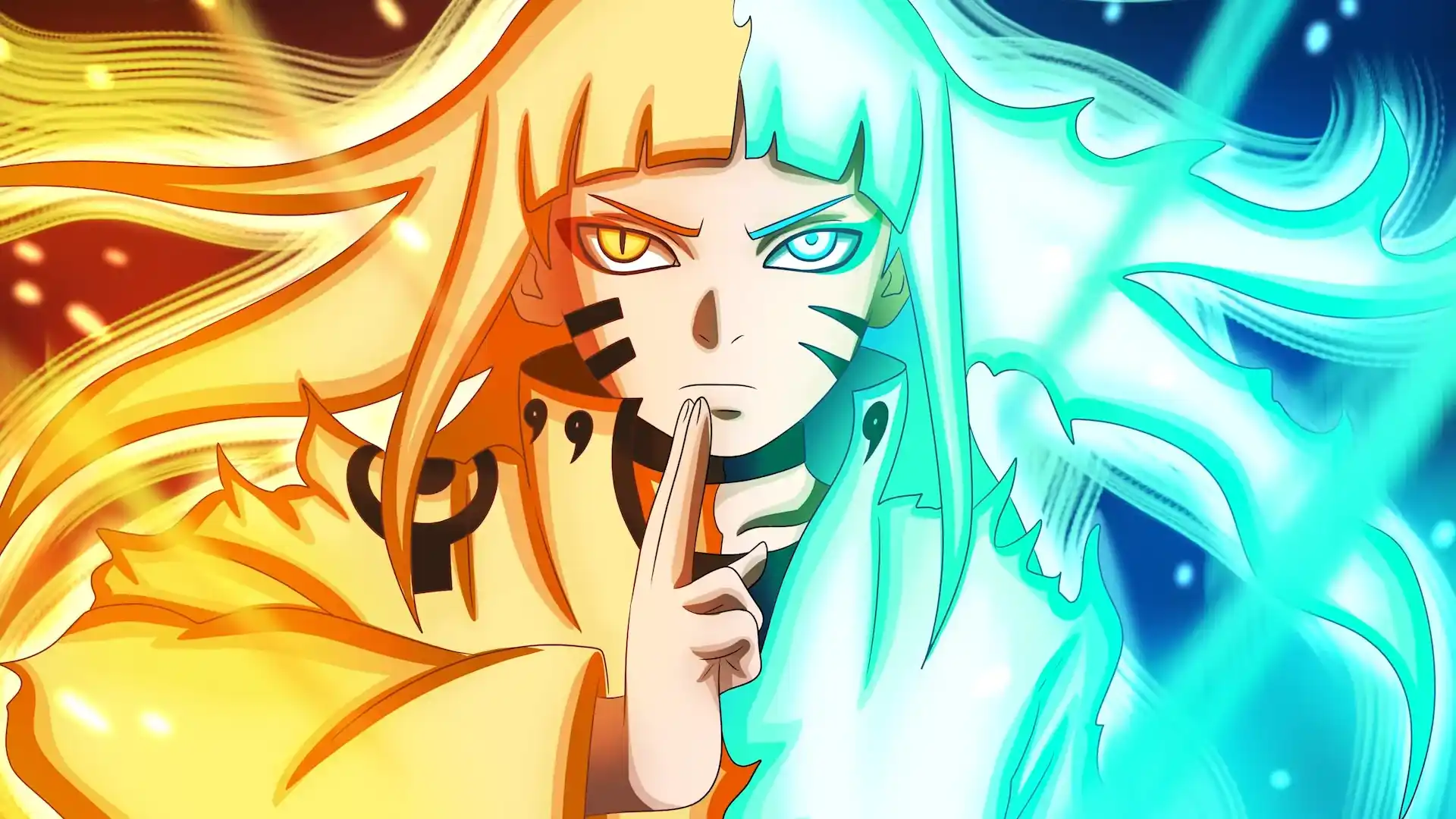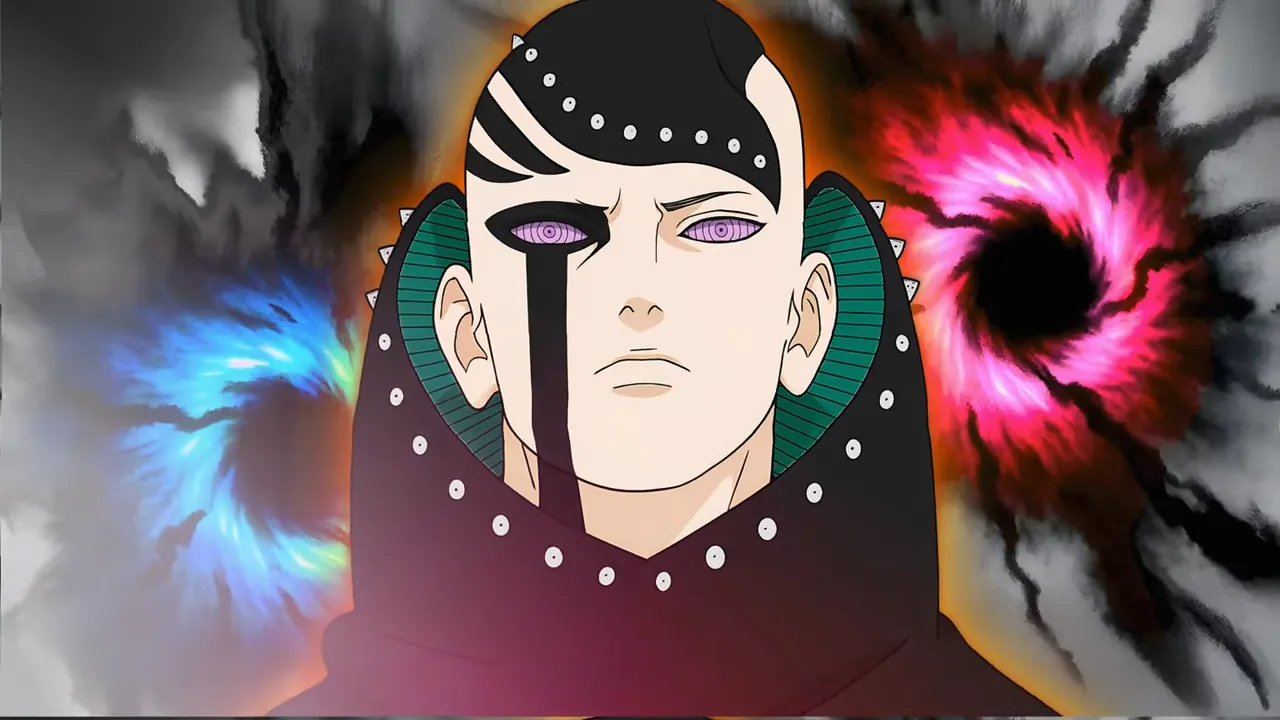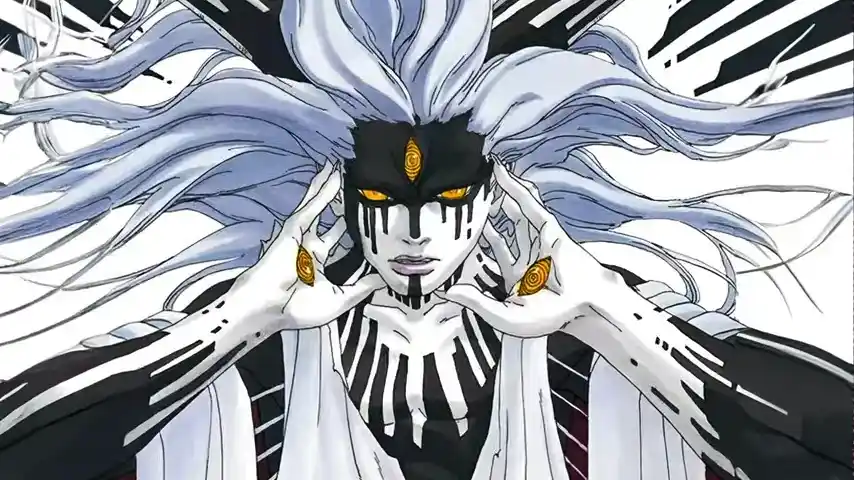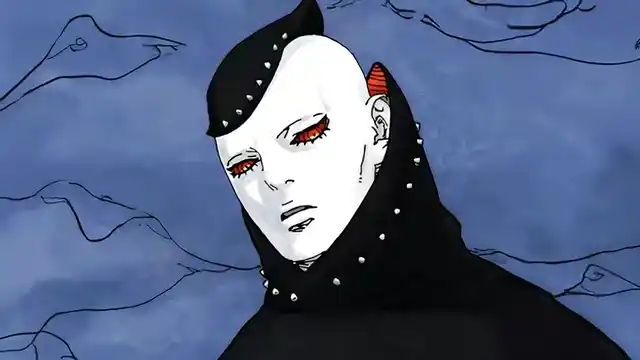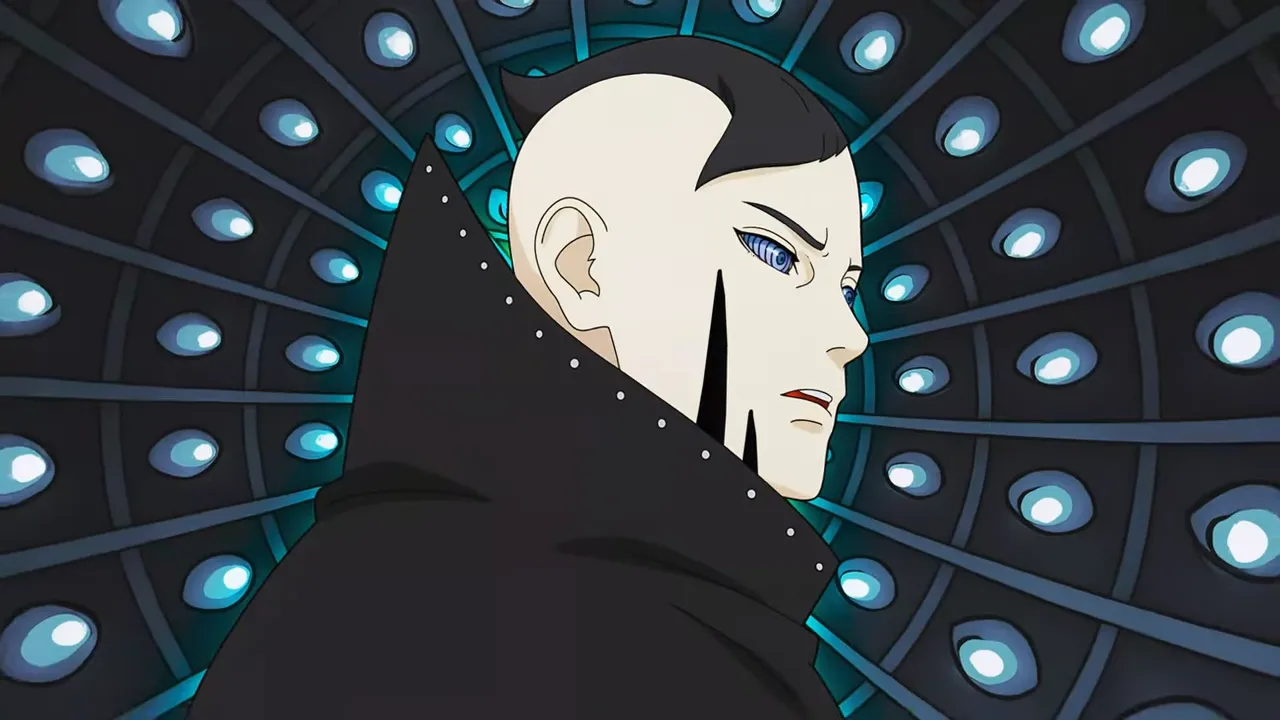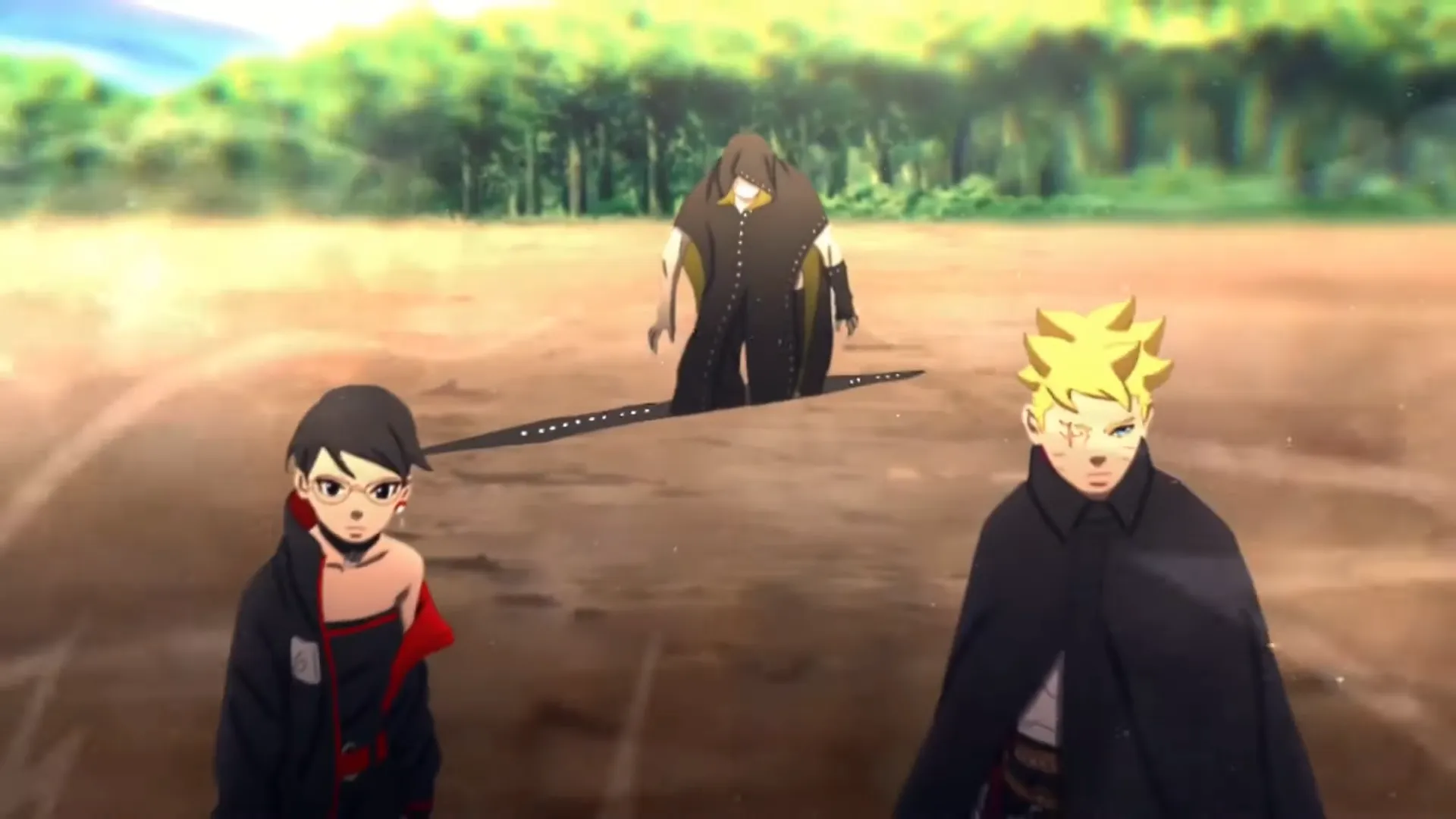Boruto Two Blue Vortex – Jura’s Master Plan
Jura’s Plan Finally Revealed – Intrigues & Mysteries
The new chapter of Boruto Two Blue Vortex manga surprised but left mixed feelings behind. On one hand, there were no battles—only intrigues and preparations for future events. On the other hand, the chapter felt less intense than expected, lacking enough details to fully immerse the reader in the story.
Yet, despite this, there were several unexpected moments worth mentioning. Matsuri demonstrated that she can control things that the Shinjū cannot. Hearing the whisper of the trees, which revealed the presence of Boruto in the desert and the trail of a frog, she followed the lead. Even the deeply buried roots of trees were able to point her toward Orochimaru’s hideout, hidden by Koji using genjutsu.
This seems almost mystical, but in her actions lies a power not to be underestimated. In this chapter, entirely new facets of the Shinjū were revealed. Until now, we thought of them as embodiments of pure evil—creatures devoid of morality or any desire for peace. But Shikamaru, in his style, broke this stereotype. He convinced Konohamaru that the Shinjū are not pure evil, but rather children born without experience or understanding of the world. They are just beginning their journey, naive and vulnerable to deception.
His plan is simple: gain their trust so that, when they open up, a decisive blow can be dealt. Matsuri’s behavior suggests that the Shinjū are capable of more than just hatred toward their targets. She clearly showed signs of affection for Konohamaru, shedding light on Jūra’s behavior as well as his interest in books, history, and the world around him. If we recall the interaction between Hidarī and Sarada, it leads us to a new theory.
Matsuri was created through the absorption of a girl who secretly had feelings for Konohamaru and, even after becoming a Shinjū, retains her love for him. So why does Hidarī want to destroy Sarada if he is her father, and paternal love is usually unconditional? This raises a thought: perhaps Sasuke doesn’t feel true affection for his daughter, or maybe he sees her as an obstacle? What are Ikemoto and Kishimoto trying to tell us through these strange and intriguing storylines?
Shikamaru noted that even their life energy does not belong to them and must return to its source. But the Shinjū believe they deserve this life despite their dependence on someone else’s strength. Their naivety is both their strength and weakness. Jūra uses the Shinjū not as weapons, but more as resources to fuel his goals. Perhaps he doesn’t even need their power, as he is incredibly powerful on his own.
Shikamaru believes that Jūra is collecting his scattered body parts, but his true intentions remain a mystery. He clearly sees Boruto as not just a threat but also a potential tool for his own plans. Jūra seems to have a special connection to nature. He may be able to sense chakra the way Naruto does in Sage Mode or how Momoshiki can.
This makes him particularly dangerous because if Matsuri tracks Boruto using trees, Jūra likely does so in his own way, playing with him like a cat with a mouse. In the desert, Sarada and Mitsuki face Ryuu. But it’s clear that defeating him with a single strike is not possible. This will be a key moment for Ryuu, potentially changing his personality and awakening him to a new reality.
But will they be able to endure? For now, everything is going according to Koji’s plan, but it is clear that he doesn’t fully understand the challenges ahead. This is the perfect moment for Sarada to awaken her Mangekyō Sharingan. But her path to this is not easy. While Boruto is getting further from the possibility of intervening, Jūra is preparing his next move.
No matter what Boruto thinks, Jūra surely knows his location and is simply waiting to play out his scenario. If Matsuri is not defeated, Boruto’s allies will be in serious danger. Jūra sees Koji as a threat due to his knowledge and might decide to attack the hideout. If this happens, Boruto will have to leave Konoha to protect his comrades.
But will he be able to avoid a confrontation with Jūra? I have come to the conclusion that everything Jūra and his allies are doing is part of a plan to eliminate Boruto. Let me explain in more detail. Could all the Shinjū have been specifically chosen and act this way due to Jūra’s influence? Yes, this is quite possible.
If we consider Jūra as a powerful manipulator who can control or modify others, his influence could be the reason the Shinjū behave the way they do. He managed to create and transform these beings, so their behavior is likely part of his strategy. Their naivety and vulnerability, as described in the chapter, could have been intentionally shaped to manipulate situations and people around them, including Boruto.
This also adds depth to Jūra’s character, who uses his creations not as weapons but as resources to further his own goals. Could the people from whom the Shinjū were created have been chosen because of their connection to Boruto? This is also quite likely. If the Shinjū are linked to certain individuals, this could be part of a more complex strategy by Jūra to manipulate and create a threat for Boruto.
Perhaps the people they were created from had personal ties to Boruto, adding an emotional and psychological element for the main character. This adds another layer to the narrative, where Boruto may face enemies not only externally but on a deeper level, whether through family connections, memories, or feelings. Could this be part of a larger plan to eliminate Boruto, orchestrated by Jūra? Undoubtedly, this is also possible.
This entire plot could be part of Jūra’s carefully thought-out plan to eliminate Boruto. His manipulations of the Shinjū may be aimed at creating situations that force Boruto through psychological and physical trials, perhaps even bringing him to a decisive moment when he faces a real threat. Jūra, it seems, is a strategist, and given his abilities and mysterious nature, he might be the one planning not just Boruto’s destruction but his fate, playing on his weaknesses and attachments.
Shikamaru, as always, displays incredible strategic insight, allowing him to understand and decipher even the most complex schemes. However, with Jūra, his task becomes much more difficult. Jūra is not just an enemy that can be easily figured out.
He turns out to be a master manipulator, and his actions are calculated several steps ahead. Shikamaru likely already understands that Jūra is behind the entire situation, and he is smarter than he appears. Jūra is merely hiding behind the mask of a tailed beast to avoid being underestimated, and it’s important to realize that Jūra acts in such a way that everything seems like a coincidence or a random series of events.
His manipulations not only physically affect those around him but also psychologically draw them into his game. Shikamaru might notice that everything is too perfectly planned to be a coincidence. However, his ability to predict enemy moves could be severely limited if he does not know the full picture.
Jūra not only uses the Shinjū as resources but also conceals his true intentions, making his actions hard to detect. Nevertheless, in the end, Shikamaru will likely see these threads and understand that Jūra is playing on a much higher level than just creating conflicts. He will begin to suspect that the entire situation is just part of a larger plan aimed at destroying Boruto.
However, to fully grasp how everything is set up and how to prevent the final trap, Shikamaru may need time and additional information, which he will have to gather. Thus, Shikamaru might realize that Jūra is manipulating everyone, but to decipher all of his moves, it will require not only the ability to predict but also a deep understanding of Jūra’s psychology and goals.
Chapter 17 of Boruto: Two Blue Vortex opens up new and mysterious aspects of both the main characters and their enemies, making us think about Jūra’s true intentions and his manipulations of the Shinjū. This is not just a battle of strength but a deep psychological game, where every step is carefully calculated. The Shinjū, lacking experience but full of naivety, become not just weapons but resources in Jūra’s hands, which he skillfully uses to achieve his goals.
The connection between the Shinjū and the people from whom they were created adds complexity and drama, as every move, every decision, could bring not just a physical threat but also psychological pressure on Boruto.
His struggle against this evil becomes not only external but internal, where he will have to face personal experiences and moral dilemmas. Jūra, possessing not only power but also strategic genius, gradually draws Boruto into a trap, where he will be forced to make decisions that could affect not only his life but the fate of the entire world.
The destruction of Boruto is not just an end goal; it is part of a larger plan that Jūra is slowly but surely bringing to life. The chapter leaves many questions unanswered, but one thing is clear—Jūra’s war is not just a battle for power. It is a fight for control over the fate of everyone connected to Boruto, where every move matters, and every decision could be fatal.
The latest chapter of Boruto Two Blue Vortex intensifies the mystery surrounding Jūra’s true motives. His calculated actions suggest that the Shinjū are more than mere pawns—they are intricately woven into a deeper strategy to manipulate Boruto. Meanwhile, Sarada and Mitsuki’s confrontation with Ryuu teeters on the edge of a breakthrough, possibly pushing Sarada toward awakening her full potential. As Koji’s plans unfold, Boruto finds himself cornered, raising the question: is he truly in control of his fate, or merely another piece in Jūra’s grand design?

